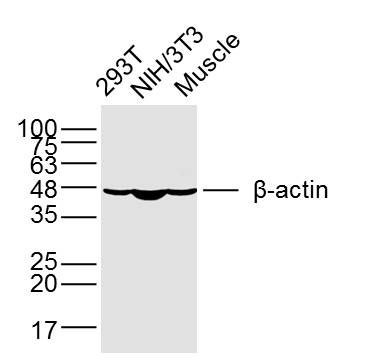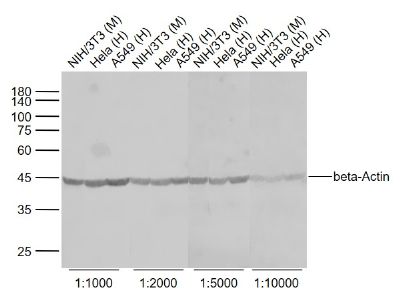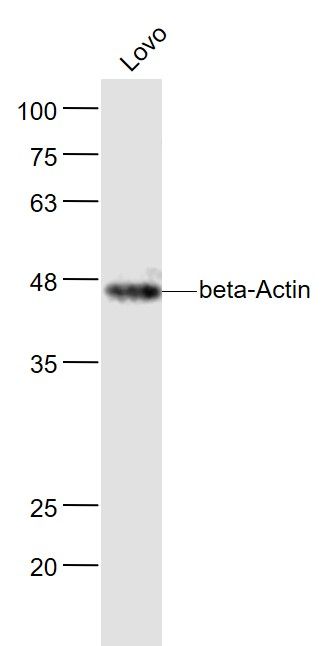英文名稱beta-Actin (Loading Control)
中文名稱β-肌動蛋白/β-Actin(內參)單克隆抗體
別 名Beta Actin; beta-Actin; ACTB; Actin cytoplasmic 1; Actin, beta; Beta actin; beta cytoskeletal actin;A X actin like protein; ACTB; Actin cytoplasmic 1; alpha sarcomeric Actin; Actx; Beta cytoskeletal actin; Melanoma X actin; PS1TP5BP1; ACTB_HUMAN.
產品類型內參抗體
研究領域腫瘤 細胞生物 信號轉導 細胞骨架
抗體來源Mouse
克隆類型Monoclonal
克 隆 號1A2
交叉反應Human, Mouse, Rat, (predicted: Chicken, Dog, Pig, Cow, Sheep, Fish, Guinea Pig, Hamster, Cat, )
產品應用WB=1:5000-20000 ELISA=1:5000-10000 IHC-P=1:200-1000 IHC-F=1:200-1000 ICC=1:100 IF=1:200-500 (石蠟切片需做抗原修復)
not yet tested in other applications.
optimal dilutions/concentrations should be determined by the end user.
分 子 量42kDa
細胞定位細胞漿
性 狀Liquid
濃 度1mg/ml
免 疫 原KLH conjugated synthetic peptide derived from human beta-Actin:
亞 型IgG
純化方法affinity purified by Protein G
儲 存 液0.01M TBS(pH7.4) with 1% BSA, 0.03% Proclin300 and 50% Glycerol.
保存條件Shipped at 4℃. Store at -20 °C for one year. Avoid repeated freeze/thaw cycles.
PubMedPubMed
產品介紹Loading Control
This gene encodes one of six different actin proteins. Actins are highly conserved proteins that are involved in cell motility, structure, and integrity. This actin is a major constituent of the contractile apparatus and one of the two nonmuscle cytoskeletal actins. [provided by RefSeq, Jul 2008].
Function:
Actins are highly conserved proteins that are involved in various types of cell motility and are ubiquitously expressed in all eukaryotic cells.
Subunit:
Polymerization of globular actin (G-actin) leads to a structural filament (F-actin) in the form of a two-stranded helix. Each actin can bind to 4 others. Identified in a mRNP granule complex, at least composed of ACTB, ACTN4, DHX9, ERG, HNRNPA1, HNRNPA2B1, HNRNPAB, HNRNPD, HNRNPL, HNRNPR, HNRNPU, HSPA1, HSPA8, IGF2BP1, ILF2, ILF3, NCBP1, NCL, PABPC1, PABPC4, PABPN1, RPLP0, RPS3, RPS3A, RPS4X, RPS8, RPS9, SYNCRIP, TROVE2, YBX1 and untranslated mRNAs. Component of the BAF complex, which includes at least actin (ACTB), ARID1A, ARID1B/BAF250, SMARCA2, SMARCA4/BRG1, ACTL6A/BAF53, ACTL6B/BAF53B, SMARCE1/BAF57 SMARCC1/BAF155, SMARCC2/BAF170, SMARCB1/SNF5/INI1, and one or more of SMARCD1/BAF60A, SMARCD2/BAF60B, or SMARCD3/BAF60C. In muscle cells, the BAF complex also contains DPF3. Found in a complex with XPO6, Ran, ACTB and PFN1. Component of the MLL5-L complex, at least composed of MLL5, STK38, PPP1CA, PPP1CB, PPP1CC, HCFC1, ACTB and OGT. Interacts with XPO6 and EMD. Interacts with ERBB2.
Subcellular Location:
Cytoplasm. cytoskeleton.
Tissue Specificity:
Ubiquitously expressed in all eukaryotic cells.
Post-translational modifications:
ISGylated.
Oxidation of Met-44 by MICALs (MICAL1, MICAL2 or MICAL3) to form methionine sulfoxide promotes actin filament depolymerization. Methionine sulfoxide is produced stereospecifically, but it is not known whether the (S)-S-oxide or the (R)-S-oxide is produced.
DISEASE:
Defects in ACTA1 are the cause of nemaline myopathy type 3 (NEM3) [MIM:161800]. A form of nemaline myopathy. Nemaline myopathies are muscular disorders characterized by muscle weakness of varying severity and onset, and abnormal thread-or rod-like structures in muscle fibers on histologic examination. The phenotype at histological level is variable. Some patients present areas devoid of oxidative activity containg (cores) within myofibers. Core lesions are unstructured and poorly circumscribed.
Defects in ACTA1 are a cause of myopathy congenital with excess of thin myofilaments (MPCETM) [MIM:161800]. A congenital muscular disorder characterized at histological level by areas of sarcoplasm devoid of normal myofibrils and mitochondria, and replaced with dense masses of thin filaments. Central cores, rods, ragged red fibers, and necrosis are absent.
Similarity:
Belongs to the actin family.
SWISS:
P60709
Gene ID:
60
Database links:
Entrez Gene: 396526 Chicken
Entrez Gene: 60 Human
Entrez Gene: 11461 Mouse
Entrez Gene: 100009272 Rabbit
Entrez Gene: 81822 Rat
Omim: 102630 Human
SwissProt: P60706 Chicken
SwissProt: P60712 Cow
SwissProt: P60708 Horse
SwissProt: P60709 Human
SwissProt: P60710 Mouse
SwissProt: P29751 Rabbit
SwissProt: P60711 Rat
SwissProt: P60713 Sheep
Unigene: 520640 Human
Unigene: 708120 Human
Unigene: 727576 Human
Unigene: 328431 Mouse
Unigene: 391967 Mouse
Unigene: 94978 Rat
Important Note:
This product as supplied is intended for research use only, not for use in human, therapeutic or diagnostic applications.
| 產品圖片 |  Sample: 293T Cell (Human) Lysate at 40 ug NIH/3T3 Cell (Mouse) Lysate at 40 ug Muscle (Mouse) Lysate at 40 ug Primary: Anti-β-Actin (bsm-33036M) at 1/5000 dilution Secondary: IRDye800CW Goat Anti-Mouse IgG at 1/20000 dilution Predicted band size: 42 kD Observed band size: 42 kD  Sample: NIH/3T3 (Mouse) Cell Lysate at 30 ug Hela (Human) Cell Lysate at 30 ug A549 (Human) Cell Lysate at 30 ug Primary: Anti-beta-Actin (bsm-33036M) at 1/1000~1/10000 dilution Secondary: IRDye800CW Goat Anti-Mouse IgG at 1/20000 dilution Predicted band size: 42 kD Observed band size: 42 kD Sample: Lane 1: Hela (Human) Cell Lysate at 30 ug Lane 2: NIH/3T3 (Mouse) Cell Lysate at 30 ug Lane 3: Lung (Rat) Lysate at 40 ug Lane 4: Lung (Mouse) Lysate at 40 ug Lane 5: MCF-7 (Human) Cell Lysate at 30 ug Lane 6: A431 (Human) Cell Lysate at 30 ug Lane 7: Stomach (Rat) Lysate at 40 ug Lane 8: Stomach (Mouse) Lysate at 40 ug Lane 9: Cerebrum (Rat) Lysate at 40 ug Lane 10: Cerebrum (Mouse) Lysate at 40 ug Primary: Anti-beta-Actin (bsm-33036M) at 1/1000 dilution Secondary: IRDye800CW Goat Anti-Mouse IgG at 1/20000 dilution Predicted band size: 42 kD Observed band size: 42 kD  Sample: Lovo(Human) Cell Lysate at 30 ug Primary: Anti- beta-Actin (bsm-33036M) at 1/500 dilution Secondary: IRDye800CW Goat Anti-Mouse IgG at 1/20000 dilution Predicted band size: 42 kD Observed band size: 46 kD |
我要詢價
*聯系方式:
(可以是QQ、MSN、電子郵箱、電話等,您的聯系方式不會被公開)
*內容:









